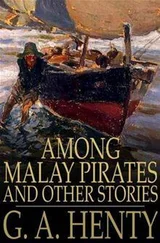“Ah, my love!” he exclaimed, “you cannot tell how I have suffered, and how I have blamed myself for permitting you and the children to leave me. I received your first letter, saying that you were comfortably lodged at Paris, but since then no word has reached me. I of course heard of the dreadful doings there, of the ascendency of the butchers, of the massacres in the streets, and the murders of the knights and ladies. A score of times I have resolved to go myself in search of you, but I knew not how to set about it when there, and I should assuredly have been seized by Burgundy and thrown into prison with others hostile to his plans. But who are these with you?”
“They are three Burgundian knights, who from love and courtesy, and in requital of a service done them by your brave esquire here, have safely brought us out of Paris and escorted us on our way. They are Count Charles d'Estournel, Sir John Poupart, and Sir Louis de Lactre.”
Holding his hand she advanced to meet them and introduced them to him.
“Gentlemen,” Sir Eustace said, “no words of mine can express the gratitude that I feel to you for the service that you have rendered to my wife and children. Henceforth you may command me to the extent of my life.”
“The service was requited before it was rendered, Sir Eustace,” Count Charles said; “it has been service for service. In the first place your esquire, with that tall archer of yours, saved my life when attacked by a band of cutthroats in Paris. This to some small extent I repaid when, with my two good friends here and some others, we charged a mob that was besieging the house in which your dame lodged. Then Master Aylmer laid a fresh obligation on us by warning us that the butchers demanded our lives for interfering in that business, whereby we were enabled to cut our way out by the Port St. Denis and so save our skins. We could not rest thus, matters being so uneven, and therefore as soon as the king's party arrived in a sufficient force to put down the tyranny of the butchers, we returned to Paris, with the intention we have carried out—of finding Dame Margaret in her hiding-place, if happily she should have escaped all these perils, and of conducting her to you. And now, having delivered her into your hands, we will take our leave.”
“I pray you not to do so, Count,” the knight said; “it would mar the pleasure of this day to me, were you, who are its authors, thus to leave me. I pray you, therefore, to enter and accept my hospitality, if only for a day or two.”
The knights had previously agreed among themselves that they would return that night to Arras; but they could not resist the earnestness of the invitation, and the whole party crossed the drawbridge and entered the castle, amid the tumultuous greeting of the retainers.
“You have been away but a few months,” Sir Eustace said to his wife, as they were crossing the bridge, “though it seems an age to me. You are but little changed by what you have passed through, but Agnes seems to have grown more womanly. Charlie has grown somewhat also, but is scarcely looking so strong!”
“It has been from want of air and exercise; but he has picked up a great deal while we have been on the road, and I, too, feel a different woman. Agnes has shared my anxiety, and has been a great companion for me.”
“You have brought all the men back, as well as Guy?”
“You should rather say that Guy has brought us all back, Eustace, for 'tis assuredly wholly due to him that we have escaped the dangers that threatened us.”
The knights and men-at-arms dismounted in the courtyard, and Sir Eustace and Dame Margaret devoted themselves at once to making them welcome with all honour. The maids hurried to prepare the guest-chambers, the servitors to get ready a banquet. Guy and his men-at-arms saw to the comfort of the knights' retainers and their horses, and the castle rang with sounds of merriment and laughter to which it had been a stranger for months. After the cup of welcome had been handed round Sir Eustace showed the knights over the castle.
“We heard the details of the siege, Sir Eustace, from your esquire, and it is of interest to us to inspect the defences that Sir Clugnet de Brabant failed to capture, for, foe though he is to Burgundy, it must be owned that he is a very valiant knight, and has captured many towns and strong places. Yes, it is assuredly a strong castle, and with a sufficient garrison might well have defeated all attempts to storm it by foes who did not possess means of battering the walls, but the force you had was quite insufficient when the enemy were strong enough to attack at many points at the same time, and I am surprised that you should have made good your defence against so large a force as that which assailed you.
“But it was doubtless in no slight degree due to your English archers. We saw in Paris what even one of these men could do.”
“I am all anxiety to know what took place there,” Sir Eustace said, “and I shall pray you after supper to give me an account of what occurred.”
“We will tell you as far as we know of the matter, Sir Eustace; but in truth we took but little share in it, there was just one charge on our part and the mob were in flight. Any I can tell you that we did it with thorough good-will, for in truth we were all heartily sick of the arrogance of these butchers, who lorded over all Paris; even our Lord of Burgundy was constrained to put up with their insolence, since their aid was essential to him. But to us, who take no very great heed of politics and leave these matters to the great lords, the thing was well-nigh intolerable; and I can tell you that it was with hearty good-will we seized the opportunity of giving the knaves a lesson.”
As soon as the visitors had arrived, mounted men had ridden off to the tenants, and speedily returned with a store of ducks and geese, poultry, wild-fowl, brawn, and fish; the banquet therefore was both abundant and varied. While the guests supped at the upper table, the men-at-arms were no less amply provided for at the lower end of the hall, where all the retainers at the castle feasted royally in honour of the return of their lady and her children. The bowmen were delighted at the return of Long Tom, whom few had expected ever to see again, while the return of Robert Picard and his companions was no less heartily welcomed by their comrades. After the meal was concluded Dame Margaret went round the tables with her husband, saying a few words here and there to the men, who received her with loud shouts as she passed along.
Then the party from the upper table retired to the private apartment of Sir Eustace, leaving the men to sing and carouse unchecked by their presence. When they were comfortably seated and flagons of wine had been placed on the board, the knight requested Count Charles to give him an account of his adventure with the cut-throats and the part he had subsequently played in the events of which he had spoken. D'Estournel gave a lively recital, telling not only of the fray with the White Hoods, but of what they saw when, after the defeat of the mob, they entered the house. “Had the passage and stairs been the breach of a city attacked by assault it could not have been more thickly strewn with dead bodies,” the count said; “and indeed for my part I would rather have struggled up a breach, however strongly defended, than have tried to carry the barricade at the top of the stairs, held as it was. I believe that, even had we not arrived, Master Aylmer could have held his ground until morning, except against fire.”
“I wonder they did not fire the house,” Sir Eustace remarked.
“Doubtless the leaders would have done so as soon as they saw the task they had before them; but you see plunder was with the majority the main object of the attack, while that of the leaders was assuredly to get rid of the provost of the silversmiths, who had powerfully withstood them. The cry that was raised of 'Down with the English spies!' was but a pretext. However, as all the plate-cases with the silverware were in the barricade, there would have been no plunder to gather had they set fire to the house, and it was for this reason that they continued the attack so long; but doubtless in the end, when they were convinced that they could not carry the barricade, they would have resorted to fire.”
Читать дальше












